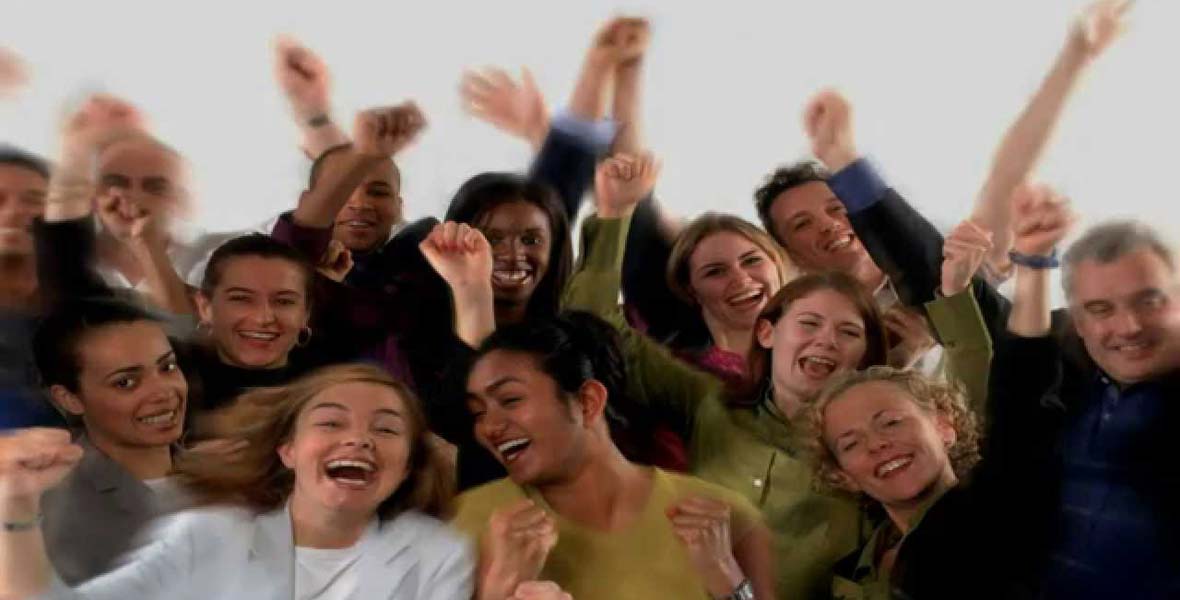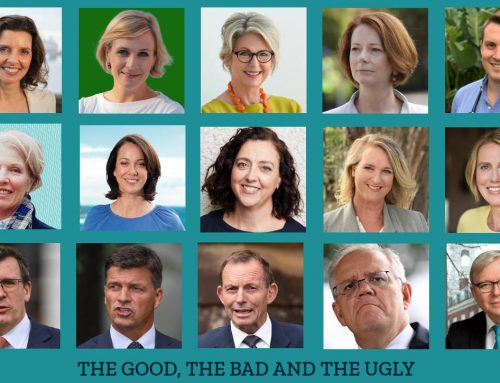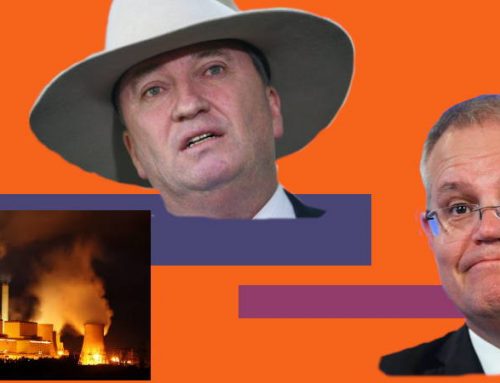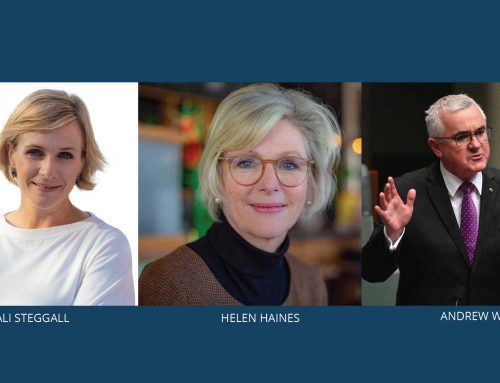Project Description
Reading Time: 17 minsThis is the second essay on Rockflat talking about independent candidates for the forthcoming Federal election. As the election draws closer, so things move around, polls change as do opinions. Some of the information in the first essay is repeated here – you can read the first one here.
The dominant two-party Federal political system in Australia has evolved from starting as a convenient way to pool resources and harness like-minded voters to a system that is cumbersome, corrupt and divisive.
Both major parties, Labor and the coalition of Liberals and National Party, engage in factional deals to by-pass potentially contentious rank-and-file pre-selection procedures for Federal elections, thereby locking out local party members from the opportunity to either stand for pre-selection themselves, or choose a local candidate who is standing. A competitive rank-and-file pre-selection process reveals a great deal about candidates as potential members of parliament, and is a fundamental principal of a good democracy.
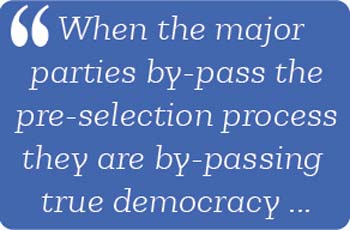 Some reasons why a party would engage in pre-selection interference in individual electorates are, to reward loyal party workers, to pay back generous party donors, to shore up support for the current party leadership, and most of all to ensure that the different factions are represented in the “workshop” where policy and direction are decided. These are not good reasons for debasing the democratic process. The ideal of democracy is to ensure that all the people get a say in running the government through their nominated local member. When the major parties bypass the pre-selection process they are by-passing true democracy.
Some reasons why a party would engage in pre-selection interference in individual electorates are, to reward loyal party workers, to pay back generous party donors, to shore up support for the current party leadership, and most of all to ensure that the different factions are represented in the “workshop” where policy and direction are decided. These are not good reasons for debasing the democratic process. The ideal of democracy is to ensure that all the people get a say in running the government through their nominated local member. When the major parties bypass the pre-selection process they are by-passing true democracy.
As this essay is published, there is an unresolved internal battle between factions fighting over candidate selections in the NSW Liberal Party. Morrison, who is a NSW Liberal as well as Prime Minister, appears to keep out of the fracas but his unofficial proxy and factional ally Alex Hawke is a key player in trying to persuade or coerce the state executive to bypass pre-selections in certain electorates in favour of factional choices. However the battle plays out, the only loser will be the Liberal Party as they have still not chosen candidates in a number of key seats with an election due before the end of May.
Here are two examples of current party interference with the pre-selection process that are playing out now.
HUGHES – LIBERAL
The Sydney seat of Hughes is currently held by former Liberal Craig Kelly, previous court jester and muckraker and now yet another stooge for Clive Palmer. Kelly now sits on the cross benches, having resigned from the Liberals. There were a number of local candidates ready to face pre-selection, but the NSW Liberal right faction intervened with the endorsement of Alex Dore, the nephew of The Australians editor in chief, for an uncontested tilt at Parliament. As well as the Liberal hierarchy, Dore is also supported by Alan Jones – that is a worry! It is not yet a done deal as the Hughes Federal electoral council is fed up with Canberra’s interference, and behind the scenes battle lines are being drawn.
Hughes liberals must be getting used to this because it is over nine years since there was a free and open rank-and-file pre-selection for the seat. As a matter of interest, the court jester Kelly was also protected from facing pre-selection in 2019, and his protector was non-other than SLOMO!
For Hughes voters there is a reprieve. For baked-on Liberals who could not possibly consider voting for Labor, there are two excellent and moderate independent candidates who have nominated for Hughes – Linda Seymour, an architectural design specialist and Georgia Steele, a corporate lawyer. Both women were nominated by community groups rightly concerned at having Kelly as their member.
FOWLER – LABOR
The safe Labor seat of Fowler in Western Sydney has been held by retiring Labor member Chris Hayes. Hayes endorsed the dynamic young lawyer Tu Le for pre-selection to replace him. It looked a very good choice, until Kristina Keneally decided to abandon the Senate for a House of Reps seat – and Fowler was the chosen seat. Although this wasn’t quite a ‘coup d’état’ by Keneally, the Labor power brokers ‘persuaded’ Tu Le to stand aside. Keneally is experienced and a formidable politician but it’s pity that Australia is going to miss out on the talents of Tu Le – at least for the time being.
One thing is certain, candidates who are “captains choice” or are parachuted in to seats without having to face the party members of that seat for pre-selection are not there for the good of the community they supposedly represent.
ANTI-INDEPENDENT SENTIMENT AMONGST THE CONSERVATIVES
The Liberal Party appears to be nervous about the upsurge of interest in non-party candidates, and a number of Liberal members have actually been quite defensive about the perceived threat from independents.
Federal Liberal director Andrew Hirst used a fundraising email last year to dub them “faux independents” running against Liberals as part of a “left-wing agenda”.
The Prime Minister went further, insisting that a vote for an independent was a vote for Labor. Liberal member for Mackellar Jason Falinski said independents will support Labor and the Greens, as well as hinting that some independents are actually supported by Labor and the Greens!
Liberal senator Andrew Bragg has asked the Australian Electoral Commission to investigate the funding of the various independent support groups. He has also warned voters that “if people want to see particular initiatives, whether they be policy initiatives or local initiatives pursued, then they need to have a member in their area that is a member of the government”.
Senator Braggs comment is clearly erroneous as has been shown in seats recently held by Helen Haines (Indi) and Zali Steggall (Warringah) and North Sydney, which was won and held by popular independent Ted Mack from 1990 until he retired in 1996. These independent members have managed to acquire more support for initiatives in their electorates than previous sitting “party” members were able to.
THE INDEPENDENTS
The Breakdown – Electorates to watch:
There will be more than a hundred independents standing for election in this years Federal election. Many are standing on single issues, some are standing without any real issues, and this time there are a number of independents standing with sound policies, and excellent community organisations backing them – just the type of person who would make an ideal member! Some electorates with outstanding independent candidates to watch are Wentworth, Mackellar, North Sydney, Hughes, Kooyong, Goldstein, Flinders, Hume and Nicholls
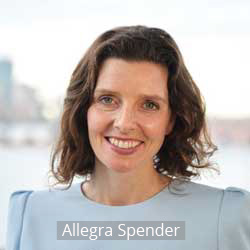 Wentworth – Allegra Spender is the “Voices of Wentworth”1 endorsed independent candidate for Wentworth in Sydneys eastern suburbs. Allegra is a strong climate and renewable energy advocate with an impressive liberal (that’s small ‘l’) pedigree. Allegra is the daughter of John Spender, Liberal member for Warringah from 1980 to 1990. Wentworth is currently held by Liberal David Sharma who narrowly won the seat from another independent Kerryn Phelps in 2019.
Wentworth – Allegra Spender is the “Voices of Wentworth”1 endorsed independent candidate for Wentworth in Sydneys eastern suburbs. Allegra is a strong climate and renewable energy advocate with an impressive liberal (that’s small ‘l’) pedigree. Allegra is the daughter of John Spender, Liberal member for Warringah from 1980 to 1990. Wentworth is currently held by Liberal David Sharma who narrowly won the seat from another independent Kerryn Phelps in 2019.
As well as being a former business analyst Allegra was also the chair of the Sydney Renewable Power Company, an environmental impact investment company, that funded the installation of the largest CBD solar array in Australia at the time. Now, as CEO of the Australian Business and Community Network, she works to address educational disadvantage by partnering with leading Australian businesses.
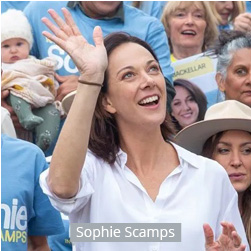 Mackellar – Dr Sophie Scamps, a local doctor, mother and community-minded candidate who has worked as a GP in Narrabeen and in the emergency room at Mona Vale Hospital. Sophie is up against the very defensive Liberal Jason Falinski, who enjoyed a 15% margin after the last election.
Mackellar – Dr Sophie Scamps, a local doctor, mother and community-minded candidate who has worked as a GP in Narrabeen and in the emergency room at Mona Vale Hospital. Sophie is up against the very defensive Liberal Jason Falinski, who enjoyed a 15% margin after the last election.
On her website Sophie says “Like many of you in our community, I’ve become increasingly frustrated by the inaction of our politicians on important issues like climate change, integrity, small business support and health.”
“I’m stepping up to take our community’s concerns to Canberra, free from party politics and political factions. As an Independent MP, I can drive new ideas, generated from our own community. I can negotiate without getting bogged down in ideology, partisanship, or internal party battles.”
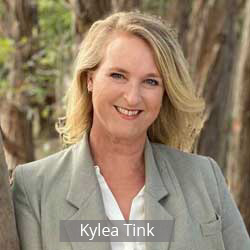 North Sydney – Kylea Tink from Northbridge is a mother who has lived in the electorate for 15 years. Kylea’s platform is headed by the need for urgent action on climate, an economy looking forward, a strong federal integrity commission and equality and respect. As with the other independent candidates mentioned her, Kylea puts a great deal of importance on acting for the community, not the political party.
North Sydney – Kylea Tink from Northbridge is a mother who has lived in the electorate for 15 years. Kylea’s platform is headed by the need for urgent action on climate, an economy looking forward, a strong federal integrity commission and equality and respect. As with the other independent candidates mentioned her, Kylea puts a great deal of importance on acting for the community, not the political party.
Kylea stands against sitting Liberal member Trent Zimmerman, one of the more moderate liberals, but still unable to vote for community benefit and interests over his party.
Hughes – The situation in the Hughes electorate has been discussed earlier in this essay. There are two nominations from independent candidates so far, both are good. Given the state of the pre-selection debacle going on with the Liberals over Hughes, and the fragmentation within the party, it’s a pity that the independent committees don’t get behind one or other of the two candidates because they just might win this seat if they did.
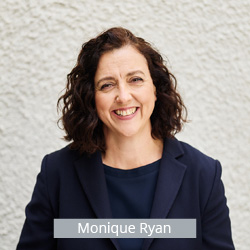 Kooyong – Dr Monique Ryan is standing as an independent candidate in the seat of Hughes with the endorsement of Voices of Kooyong and Kooyong Independents. Dr Ryan is director of the children’s hospital neurology department and will be contesting the seat with the sitting Liberal, Treasurer Josh Frydenberg. The main issues for Dr Ryan are climate, the integrity commission, gender equality and aged care & health.
Kooyong – Dr Monique Ryan is standing as an independent candidate in the seat of Hughes with the endorsement of Voices of Kooyong and Kooyong Independents. Dr Ryan is director of the children’s hospital neurology department and will be contesting the seat with the sitting Liberal, Treasurer Josh Frydenberg. The main issues for Dr Ryan are climate, the integrity commission, gender equality and aged care & health.
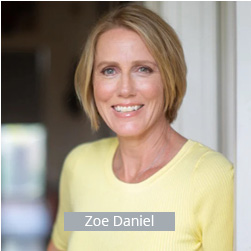 Goldstein – Voices of Goldstein have chosen high profile journalist and former ABC foreign correspondent Zoe Daniel to stand as an independent in the seat of Goldstein against sitting Liberal Tim Wilson. Daniel says “As a journalist, I’ve been an observer for decades. The next parliament is critical to the future of our children, our environment, our economy, and our planet now and for generations to come…”, and in her video launch Daniel said: “Until now I’ve waited for our governments to respond to the immense business and job opportunities that a renewable climate economy presents – to lead.” The former long-term Liberal member for Goldstein, Ian Macphee is an ardent supporter of Zoe Daniel and says she “will do all that she can to return our federal Parliament to a democratic institution.”
Goldstein – Voices of Goldstein have chosen high profile journalist and former ABC foreign correspondent Zoe Daniel to stand as an independent in the seat of Goldstein against sitting Liberal Tim Wilson. Daniel says “As a journalist, I’ve been an observer for decades. The next parliament is critical to the future of our children, our environment, our economy, and our planet now and for generations to come…”, and in her video launch Daniel said: “Until now I’ve waited for our governments to respond to the immense business and job opportunities that a renewable climate economy presents – to lead.” The former long-term Liberal member for Goldstein, Ian Macphee is an ardent supporter of Zoe Daniel and says she “will do all that she can to return our federal Parliament to a democratic institution.”
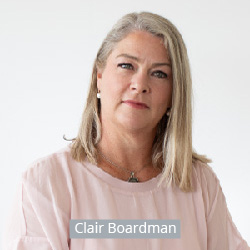 Flinders – This fringe Melbourne seat is considered safe by Liberals. The sitting member is Liberal Health Minister Greg Hunt who has held the seat for 20 years. Voices of Flinders independents group has chosen Clair Boardman, a senior public health commander with the Victorian Department of Health as an independent candidate for Flinders. Given the current political atmosphere and the fact that Hunt no doubt has had a large personal following, this seat does appear vulnerable. Like most other independent candidates, Clair nominates a federal integrity commission, political donation reforms and stronger action to tackle climate change as key issues for her – and for Flinders.
Flinders – This fringe Melbourne seat is considered safe by Liberals. The sitting member is Liberal Health Minister Greg Hunt who has held the seat for 20 years. Voices of Flinders independents group has chosen Clair Boardman, a senior public health commander with the Victorian Department of Health as an independent candidate for Flinders. Given the current political atmosphere and the fact that Hunt no doubt has had a large personal following, this seat does appear vulnerable. Like most other independent candidates, Clair nominates a federal integrity commission, political donation reforms and stronger action to tackle climate change as key issues for her – and for Flinders.
Hume – a rural seat south of Sydney, taking in the large regional centre of Goulburn. The seat has been held by Angus Taylor, Minister for Energy since 2013 and was last a non-coalition Labor seat after the ‘It’s Time” election of Gough Whitlam. The task to unseat an unpopular member of parliament in what is a safe coalition seat has fallen to Penny 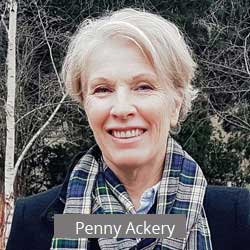 Ackery, the endorsed Voices of Hume independent candidate. Penny is a long-term Goulburn resident and former school teacher, is endorsed former Indi independent Cathy McGowan and supported by Climate 200.
Ackery, the endorsed Voices of Hume independent candidate. Penny is a long-term Goulburn resident and former school teacher, is endorsed former Indi independent Cathy McGowan and supported by Climate 200.
Penny Ackery will be a formidable opponent for Taylor who, in case recent climate and Santos publicity has blunted memories of Taylor’s past errors, still hasn’t had to properly explain himself in regard to his vitriolic and unwarranted attack on Clover Moore; nor has Taylor, Morrison, Joyce or anyone in the government explained satisfactorily the controversial water buyback, in which an $80 million water government purchase was made from a company with which Taylor was associated before entering parliament – this matter still has a shroud of secrecy over it, as does the illegal destruction of native Monaro grassland on the Taylor family property near Cooma.
There is no doubt that Penny Ackery is a person who could unseat Taylor.
Three successful independents from the 2019 election are re-contesting their seats, they are:
Helen Haines in Indi, Zali Steggall in Warringah, and Andrew Wilkie in Clark
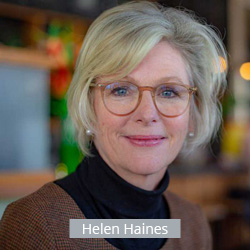 Indi – The “Voices of …”1 movement really started with the election of Cathy McGowan in the Victorian rural seat of Indi in 2013. Kathy was succeeded by Helen Haines, another independent, on her retirement in 2019. Helen is a strong community person who is very enthusiastic about restoring integrity to politics. As such Helen has been a strong advocate for the passing of the long overdue Integrity bill, promised by Morrison before the 2019 election! Helen and the other two independents Zali Steggall and Andrew Wilkie have been strong voices in our Parliament since 2019, and have all been “over-achievers” in their electorates as well as in the Parliament.
Indi – The “Voices of …”1 movement really started with the election of Cathy McGowan in the Victorian rural seat of Indi in 2013. Kathy was succeeded by Helen Haines, another independent, on her retirement in 2019. Helen is a strong community person who is very enthusiastic about restoring integrity to politics. As such Helen has been a strong advocate for the passing of the long overdue Integrity bill, promised by Morrison before the 2019 election! Helen and the other two independents Zali Steggall and Andrew Wilkie have been strong voices in our Parliament since 2019, and have all been “over-achievers” in their electorates as well as in the Parliament.
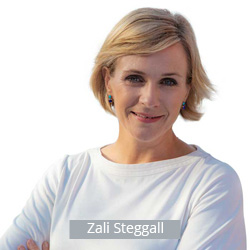 Warringah – Zali Steggall is the relatively high profile member for Warringah. Her high profile is mainly due to Zali being a most effective and hard-working member of Parliament, and for the fact that she defeated the former Prime Minister Tony Abbott in the 2019 election. She is also a former Olympian and barrister. The platform for Zali is fairly simple – set up a dynamic economy for sustainable growth which encompasses equality, integrity & trust, climate leadership, modern healthcare and to protect and value local life.
Warringah – Zali Steggall is the relatively high profile member for Warringah. Her high profile is mainly due to Zali being a most effective and hard-working member of Parliament, and for the fact that she defeated the former Prime Minister Tony Abbott in the 2019 election. She is also a former Olympian and barrister. The platform for Zali is fairly simple – set up a dynamic economy for sustainable growth which encompasses equality, integrity & trust, climate leadership, modern healthcare and to protect and value local life.
For some reason Morrison seems to think Warringah is a seat the Liberals could easily win back and to that end he embarrassed himself by touting two former NSW premiers Gladys Berejiklian and Michael Baird as possible candidates. Neither of the former premiers had any intention of running. At this time the Liberals have still not chosen a candidate.
Clark – The seat of Clark in Hobart Tasmania is held by independent Andrew Wilkie who won an astounding 72% of the 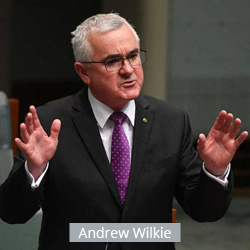 preference vote in the 2019 election – proof that he is indeed a valued member for the Clark constituents. Andrew has been in Parliament since 2010, before which he was a serving Army officer and then with the Office of National Assessments from which he resigned in protest over Australia’s participation in the Iraq war.
preference vote in the 2019 election – proof that he is indeed a valued member for the Clark constituents. Andrew has been in Parliament since 2010, before which he was a serving Army officer and then with the Office of National Assessments from which he resigned in protest over Australia’s participation in the Iraq war.
As a local member, Andrew is concerned with getting Australia on the right path to ease the climate crisis, he is a passionate advocate for the Australian Government to ‘stop sitting on their hands’ and do something about getting Julian Assange back to Australia. He is a supporter of better government allocations for healthcare, the elderly and TPI veterans. The front page of Andrew Wilkie’s website has a very visible timetable of where his mobile office will be during the next month so he is easily contactable.
In comparing the list of potential and sitting independent candidates above with the majority of Federal politicians in power today, they are quite unique in a number of ways. With the exception of Andrew Wilkie, they are all women; all have come from backgrounds other than politics and as such should have a much broader view of the world than many of the career party politicians; all are community-minded and mostly well-known in their communities; all have ideals that are important for our near future, the policies that invariably overlap between all candidates are the climate, health care and reform, the urgent need for an integrity commission in Canberra, and gender equality in the workplace and socially.
Many Australian do not identify with either the Coalition parties or Labor Party. In other words you could say they are either “independent” or swinging voters when it comes to elections. Without identifying with any particular party, some of these voters would ‘lean’ towards one or the other, just as some independent politicians do, however without a party commitment both voters and independent politicians are completely free to vote with their conscience for what they believe is right for them and their community.
Arguments most heard against independent politicians is that an independent is not part of the government and therefore their electorates suffer less funding, and independents hinder the progress of legislation through the house. In fact good governments look favorably at funding independent electorates because there is seldom an electoral cycle in Australia where any one party has a majority large enough to ignore independents. The same argument holds for the progress of legislation. A survey published by Nick Evershed in 2013 to ascertain which government was the most successful in passing legislation (based on acts passed per days in office) found it was the Gillard government in top position with an average of 0.495 acts per day, followed by the Hawke, Fraser, Keating and Whitlam administrations. The Gillard government was the only one out these five administrations that was a minority government relying on the votes of independents and the Greens to get bills through the house.
The administration of the COVID pandemic in Australia has been mishandled – the messages from all governments and from various health officials have been contradictory and changeable many times; the vaccine rollout has been spasmodic and often delayed or non-existent due to tardiness or meanness on the part of the Federal government; funding grants for employees out of work due to COVID and businesses closed due to COVID went from ‘over-the-top’ at the start to almost nothing as the pandemic persisted; millions of dollars were handed out to businesses that didn’t deserve or need the money, and again, this was the responsibility of the Federal government. Managing COVID has not been easy anywhere but in Australia it has been the resilience and ingenuity of the population that has stopped the pandemic from being the disaster it may well have been had the disconnected Federal government not had the brakes applied to it on some critical issues by state governments of both persuasions.
COVID is with us and will be staying with us in the same manner as flu, and we have to learn to live with it. Global warming due to climate change is getting worse the planet will become uninhabitable unless we take much more serious action very soon. The Coalition government has been ambivalent about climate change, and often disconnected from what is real, their rhetoric ranging from outright denial to now, “talking the talk”. “Talking the talk” is not “walking the walk” and it’s time that we had complete transparency with regard to climate policy and the relationship of government with miners, foresters and industry for the Liberals and Nationals and the unions and industry for Labor.
There will be Federal election in Australia within six months. As things stand now, at the end of January, the Morrison government has slipped in the polls and Labor has taken up most of that slippage. Despite poor polling by the Coalition, pundits are saying that the strong Coalition hold on some Queensland seats may be enough to get them over the line. However what is being overlooked is that for the very first time voters will have the opportunity to elect a community-based independent in many electorates who is approachable, knowledgeable, experienced in a life outside of the Canberra bubble, and, best of all, not tied to the decisions made in the backrooms of the major parties – whether they be for the benefit of miners, donors or unions.
If you have the opportunity in this years’ election to vote for an independent in your electorate, give it a try, after all it’s only for three years and you really have nothing to lose based on our governance in the past year or two, and you never know, you may even like it!
1 Voices groups are locally organised groups channeling growing dissatisfaction with traditional political parties that are not representative of their electorates. The first “Voices” group was founded in the electorate of Indi in 2012 around an identified need for greater democratic engagement at the community level. As of 3 December 2021 there are 38 active Voices groups across 35 electorates in Australia. (Wikipedia)
